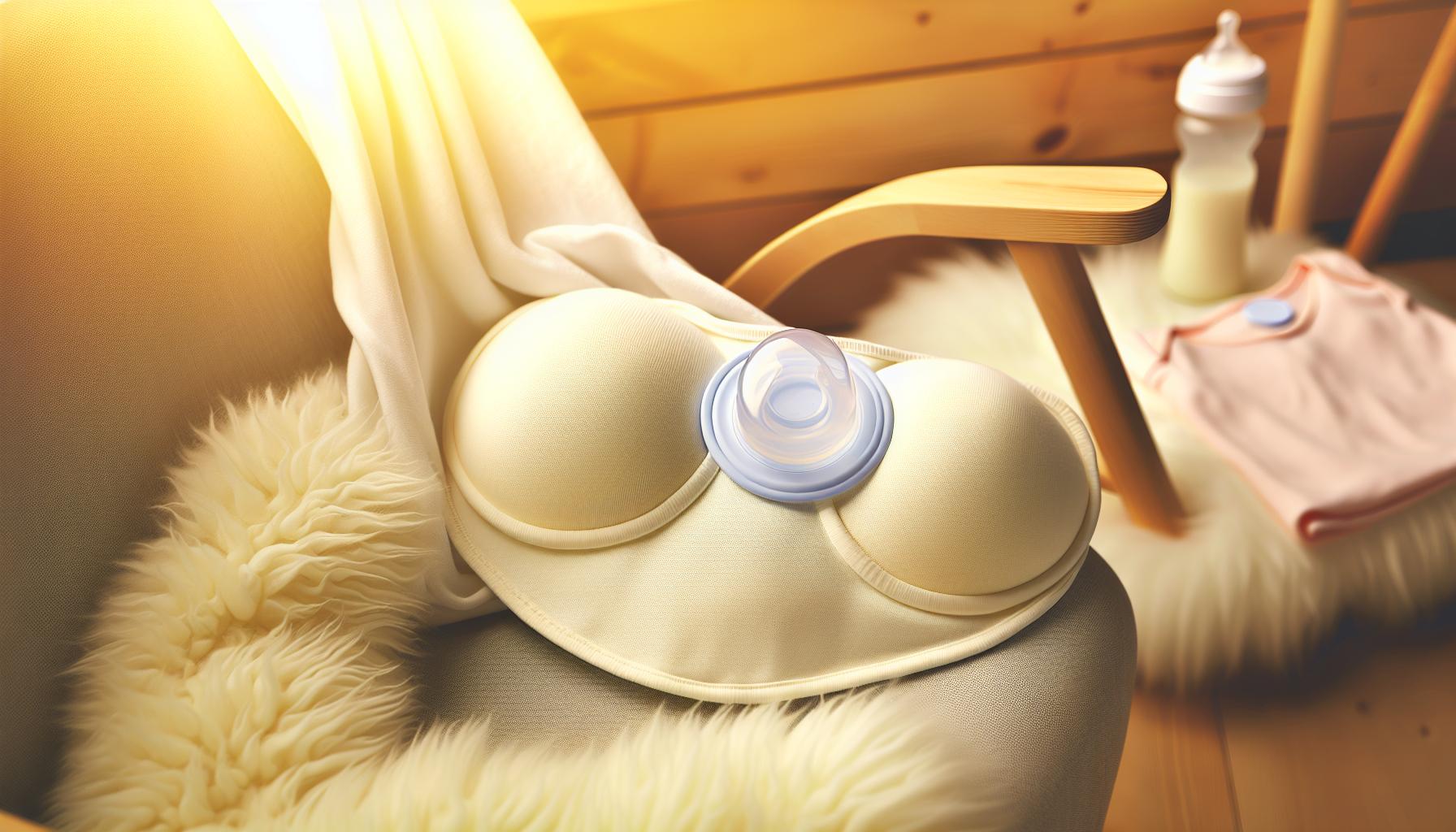Breastfeeding can be a stunning yet challenging experience, especially when it comes to comfort and discretion. Nipple covers designed for nursing mothers offer a practical solution to protect sensitive skin while ensuring confidence in any outfit. Discover how these clever accessories enhance convenience and comfort during this special time.
Understanding the Role of Nipple Covers in Breastfeeding
Enhancing Breastfeeding comfort with Nipple Covers
Navigating the journey of breastfeeding can be as beautiful as it is challenging. One practical solution that many mothers find helpful is the use of nipple covers. These innovative products serve a dual purpose: they provide comfort while also enhancing convenience, which is essential during the frequent feedings that characterize the early months of motherhood.
Nipple covers for breastfeeding can protect sensitive skin and prevent discomfort caused by friction against clothing or breastfeeding accessories. Made from soft, hypoallergenic materials, they create a barrier that reduces irritation. This feature is especially beneficial for new mothers whose bodies are still adjusting post-delivery. With the right nipple covers,breastfeeding can become a more enjoyable experience rather than one marred by physical discomfort.
Additionally, nipple covers can be a game-changer for mothers who want to maintain a sense of modesty while nursing in public. Many cover options come in discreet designs that blend seamlessly under clothing. This allows mothers to provide nourishment to their babies without feeling exposed or self-conscious. Reusable silicone nipple covers, for instance, mold to the shape of the breast and can be comfortably worn throughout the day, even while engaging in daily activities or attending social events.
Choosing the Right Nipple Covers
Selecting appropriate nipple covers is vital to ensuring comfort and effectiveness. Here are a few key factors to consider:
- Material: Look for covers made from soft, breathable fabrics or medical-grade silicone that won’t irritate sensitive skin.
- Adhesive vs. non-Adhesive: Decide if you prefer adhesive covers that stay in place or non-adhesive options that can be easily removed and reused.
- Shape: Choose covers that are contoured to fit the breast comfortably and naturally.
- Washability: Opt for materials that are easily washable for hygiene and longevity.
Incorporating nipple covers into your breastfeeding routine can create a smoother, more comfortable experience, allowing new mothers to focus on bonding with their babies rather than discomfort or modesty. As with any breastfeeding accessory, it’s notable to try different options to discover what feels best for you. Nipple covers can truly make a difference in enhancing the overall breastfeeding experience, providing both ease and reassurance for mothers navigating this vital stage of motherhood.
Choosing the Right nipple Covers for Your Needs
Understanding Your Options
Finding the right nipple covers during breastfeeding is crucial for both comfort and convenience. With a variety of materials and styles available,it’s essential to consider what will suit your needs best. most nipple covers are designed to be discreet, allowing you to wear your favorite tops without worrying about visible outlines. Additionally, they can provide the necessary coverage and protection during the breastfeeding journey.
when selecting nipple covers,pay attention to the following factors:
- Material: Silicone,fabric,and adhesive options are widely available. Silicone covers are often reusable and provide a smooth finish, while fabric options can be softer and more breathable.
- Size and Shape: Make sure to choose a nipple cover that matches your breast size and shape. Some brands offer various sizes to cater to bigger busts or smaller frames.
- Adhesiveness: Look for covers with strong adhesive that will stay in place throughout the day, especially if you’re on the move or nursing frequently.
- Comfort: Choose options that feel good against your skin, particularly as your breasts undergo changes during and after pregnancy.
Comparing Popular Nipple Covers
Understanding the specific features of different brands can help you make an informed decision. Here’s a simple comparison of popular nipple covers you might consider:
| Brand | Material | Reusable | Sizes Available | Adhesive Strength |
|---|---|---|---|---|
| Brand A | Silicone | Yes | XS to XL | Strong |
| Brand B | Fabric | No | S to L | Moderate |
| Brand C | Silicone | Yes | S to XXL | Very Strong |
Practical Considerations
In addition to features, consider how you will be using the nipple covers. For instance, if you plan to wear them under a range of clothing styles—from casual t-shirts to more form-fitting dresses—you might prefer a silicone option with a smooth finish. If you’re visiting family or friends, a more comfortable, fabric cover could provide the ease of use you need when nursing in public.
By assessing your lifestyle and breast care needs, you can confidently choose the best nipple covers for breastfeeding that align with your comfort and convenience preferences.
Tips for Using Nipple Covers Comfortably During Nursing
Understanding Comfort with Nipple Covers
Navigating the world of breastfeeding can be a blend of joys and challenges, and the right nipple covers can considerably enhance your experience. Many mothers have discovered that using nipple covers not only provides comfort but also adds convenience during nursing.However, to fully reap the benefits of these handy tools, it’s essential to use them correctly and mindfully. Here are some tips to ensure that you feel comfortable while nursing with nipple covers.
- Choose the Right Material: Prioritize silicone or breathable fabrics designed for nursing. These materials are gentle on sensitive skin and can reduce the risk of irritation.
- Ensure Proper Fit: Nipple covers should fit snugly without being too tight. A cover that’s too small can cause discomfort, while one that’s too large may slip out of place.
- Experiment with Application: Some mothers find that gently warming the covers in their hands before use can help them adhere better and feel softer against the skin.
- take Breaks: If you notice any discomfort or sensitivity, remove the nipple covers periodically to allow your skin to breathe. This can definitely help maintain overall comfort during long nursing sessions.
- Check Skin Integrity: Regularly inspect your skin for any signs of irritation. If redness or soreness appears, consider pausing use and consulting a healthcare professional.
- Practice good Hygiene: Always clean and store your nipple covers according to the manufacturer’s instructions to prevent bacteria buildup.
Real-Life Examples and Comfort Strategies
Every breastfeeding journey is unique, and so are the experiences mothers have with nipple covers. Some mothers have shared that using a thin layer of lanolin or nipple cream before applying the covers can create an extra barrier, enhancing comfort and preventing chafing. Others recommend trying different styles of nipple covers to find which ones align best with their personal breastfeeding habits.For instance, if you’re frequently nursing in public, consider using nipple covers that offer opacity and security to provide peace of mind.
Creating a comfortable nursing habitat also plays a crucial role. Ensure you have adequate support while nursing by using a comfortable chair or a nursing pillow, which can help alleviate any tension that could contribute to discomfort. An adjustable, relaxed hold on the baby can also influence how nipple covers feel during use; experimenting with different positions may reveal what works best for both you and your little one. With these strategies, using nipple covers can become a seamless part of your breastfeeding experience, enhancing both comfort and convenience.
The Benefits of Nipple Covers for New Mothers
Comfort and Confidence for New Mothers
For many new mothers, the journey of breastfeeding can come with its own set of challenges, including discomfort and the need for discreetness. one of the solutions that has gained popularity is the use of nipple covers.These innovative products not only provide physical comfort but also boost a mother’s confidence,enabling her to embrace her breastfeeding journey with ease.
Nipple covers offer several key benefits:
- Protection Against Irritation: Breastfeeding can lead to soreness and skin irritation. Nipple covers act as a barrier, protecting sensitive skin from friction caused by clothing.
- Instant Discreetness: For new mothers who may sometimes feel exposed, nipple covers provide a layer of security under clothing. This is especially useful for those who prefer to wear lighter fabrics that might reveal more than they intend.
- Easy Transition Between Feeding Sessions: Many nipple covers are designed to be reusable and easy to clean, allowing mothers to switch back and forth between feeding and public outings effortlessly.
- Variety of Designs and materials: Available in different styles, from silicone to fabric, nipple covers can cater to individual preferences and breastfeeding needs, giving mothers choices that enhance their comfort.
Promoting Self-Esteem and Comfort
Using nipple covers can significantly impact a new mother’s self-esteem. Feeling comfortable and confident can make a considerable difference in how a mother approaches breastfeeding,whether at home or in public. By minimizing the worries about leaks or visibility, mothers can focus more on the bonding experience with their newborns.
additionally, as mothers navigate the challenges of postpartum life, using nipple covers can serve as a practical reminder that self-care is essential. This simple tool is a small yet effective way to promote a more positive breastfeeding experience, allowing mothers to feel empowered and at ease during this significant life stage.
Common Concerns: Addressing Myths and Misconceptions
One prevalent myth surrounding nipple covers, especially for breastfeeding, is that they can hinder milk flow or disrupt breastfeeding routines. In reality, quality nipple covers are designed to be breathable and flexible, allowing for comfort without compromising your ability to breastfeed effectively. They can even provide a layer of protection that helps mothers feel more comfortable when nursing in public or during family gatherings.
Another concern is that using nipple covers might lead to skin irritation or allergic reactions due to the adhesive materials. To address this, it’s crucial to choose nipple covers that are made from hypoallergenic materials, such as silicone. These options ensure that the covers adhere gently without causing harm to sensitive skin.Additionally, mothers can conduct a patch test on a small area of skin before full use, making it easier to avoid any adverse reactions.
Here are some actionable tips for choosing and using nipple covers:
- Material matters: Opt for silicone or cotton for comfort and reduced risk of irritation.
- Check the adhesive: Look for products that offer a gentle, yet reliable stick without leaving residue.
- Practice hygiene: Clean and dry the area before application to enhance adherence and comfort.
- Size and shape: Ensure the nipple covers are the right size and shape for your needs to prevent slipping and ensure coverage.
These steps can definitely help alleviate common concerns and enable mothers to enjoy the convenience and comfort that nipple covers for breastfeeding can provide. Understanding their proper use is essential in debunking myths and embracing the practicality they bring to nursing experiences.
Caring for Your Nipple Covers: Maintenance and Hygiene Tips
Maintaining Hygiene for Optimal Performance
Ensuring that your nipple covers remain clean and in good condition is crucial for comfort and hygiene,especially for breastfeeding mothers. Like any intimate apparel, these products encounter moisture and bacteria, so regular cleaning is essential. Most silicone nipple covers are washable and reusable, which not only promotes sustainability but also saves money in the long run. To maintain their integrity and effectiveness, follow these maintenance tips:
- Clean Instantly After Use: After each use, rinse your nipple covers under lukewarm water to remove any residue. For deeper cleaning, use a gentle soap or cleanser free from fragrances and harsh chemicals.
- Dry Properly: Allow the nipple covers to air dry wholly before storing them. Avoid direct sunlight or high heat,as these can degrade the silicone material over time.
- store Safely: When not in use, keep your nipple covers in a travel box or pouch to prevent dust and damage. This also helps maintain their adhesive properties for longer-lasting use.
understanding Material Care
Different materials require specific care to extend their lifespan. as an example, reusable silicone covers are typically more durable and can withstand multiple wash cycles, while fabric-based designs may require hand washing to prevent fraying. Always check the manufacturer’s instructions for specific cleaning guidelines. Here’s a fast reference table to help you understand the care for various nipple cover materials:
| Material | Cleaning Method | Drying Method |
|---|---|---|
| Silicone | Wash with mild soap and water | Air dry |
| Fabric | Hand wash or machine wash in delicate cycle | Lay flat to dry |
Recognizing When to Replace
Even with proper care, nipple covers don’t last indefinitely. Look for signs that it’s time to replace them, such as losing their stickiness, visible wear and tear, or any discoloration. Replacing damaged or worn-out nipple covers is vital not only for hygiene but also for ensuring that they provide the comfort and support needed during breastfeeding. Regularly assess the condition of your nipple covers to determine if a fresh pair is needed to maintain that perfect blend of comfort and convenience explained in your breastfeeding journey.
Nipple Covers vs. Traditional Nursing Pads: What’s Best for You?
Choosing between nipple covers and traditional nursing pads can significantly impact your breastfeeding experience. Each option offers unique benefits tailored to different needs and situations. Nipple covers for breastfeeding are often designed to provide a discreet solution when you want to feel more comfortable in fitted clothing or during outings, while traditional nursing pads focus on absorbing milk leakage, ensuring that you stay dry at all times.
Nipple Covers:
Nipple covers are typically seamless and adhesive, allowing them to conform to the shape of your breast without adding bulk. Ideal for times when you want to wear clothing that hugs your figure, nipple covers can enhance your confidence by ensuring that there are no visible lines or demarcations.They provide a level of coverage without the worry of unintended leaks, making them a great companion for social events or casual outings where clothing style is a priority.
traditional Nursing Pads:
In contrast, traditional nursing pads are designed specifically to absorb milk that may leak between nursing sessions. They come in various materials, including cotton and disposable options, catering to different preferences.Their primary function is to keep you dry and comfortable, providing a barrier against any leaks that could stain your clothes. If you find yourself leaking significantly,nursing pads might potentially be more suitable for you,especially in the early stages of lactation.
| Feature | Nipple covers | Traditional Nursing Pads |
|---|---|---|
| Primary Purpose | Discreet coverage and visibility | Absorb milk leaks |
| Material | Silicone or fabric | Cotton,disposable,or waterproof |
| Ideal Scenarios | Fashion needs,social outings | Nursing at home,extended wear |
| Washability | Reusable | Varies (reusable/disposable) |
Ultimately,the best choice depends on your lifestyle,the nature of your breastfeeding journey,and personal comfort.For those needing easy concealment and minimal bulk for outings, nipple covers for breastfeeding can provide a fashionable and functional alternative.However, if you’re dealing with heavy leaking or prefer a focused solution for milk management, traditional nursing pads remain the go-to option. Consider your routine and choose the option that aligns with your needs and preferences.
Faq
What are Nipple Covers for Breastfeeding?
Nipple covers for breastfeeding are soft, flexible shields designed to protect the nipples during nursing. They can help relieve discomfort and create a barrier for those who may experience soreness or sensitivity while breastfeeding.
These covers can be a practical solution for mothers seeking additional comfort. They are made from various materials like silicone or foam and can come in different sizes. using nipple covers can also be helpful when dealing with nipple blisters or if you’re transitioning to breastfeeding after a break. For more tips, check our article on breastfeeding comfort solutions.
How do I use Nipple Covers for Breastfeeding?
Using nipple covers for breastfeeding is simple. You just place the cover over your nipple before nursing or pumping to create a protective layer.
Ensure that the cover fits snugly but comfortably. Once you’re ready to breastfeed,gently hold the cover in place or use it with a nursing bra designed to accommodate them. This approach allows for a comfortable feeding session without compromising your baby’s latch.
Why should I use Nipple Covers for Breastfeeding?
Nipple covers for breastfeeding can provide much-needed comfort for mothers experiencing soreness, sensitivity, or friction during nursing.
By acting as a barrier, these covers can help protect your nipples from further irritation, allowing for a more pleasant breastfeeding experience. They can also offer peace of mind when nursing in public, helping to boost your confidence while maintaining convenience.
Can I wear Nipple Covers all the time?
nipple covers are not designed for all-day wear. They are best used during nursing sessions or when you need protection from friction.
Wearing them constantly can lead to moisture buildup, potentially leading to infections or irritation. It’s essential to let your skin breathe and keep an eye on your nipple health. Regularly switching to natural ventilation can be beneficial.
What materials are best for Nipple Covers for Breastfeeding?
nipple covers for breastfeeding can be made from various materials, including silicone, gel, and fabric, each offering unique benefits.
Silicone covers are popular for their versatility and ease of cleaning. Gel covers provide added cushioning, while fabric options can be softer and more breathable. Choose a material that matches your comfort and needs to create a pleasant nursing experience.
Are Nipple Covers safe for my baby?
nipple covers for breastfeeding are generally safe for use, but it’s crucial to ensure they are clean and free of any substances that could harm your baby.
Always choose covers made from food-grade materials and follow the care instructions provided. Maintaining proper hygiene is essential to prevent the transfer of bacteria during breastfeeding.
How do Nipple covers affect baby’s latch?
Nipple covers for breastfeeding should not significantly affect your baby’s latch if used correctly.
Ensure that the covers you select are designed to mimic the shape and feel of the nipple. It’s helpful to practice nursing with and without the covers to find what works best for you and your baby. Proper latch is crucial for effective feeding and reducing discomfort.
In Conclusion
nipple covers can be a game-changer for breastfeeding parents seeking comfort and convenience. Whether you’re navigating the challenges of nursing in public or looking for a little extra support while managing daily activities, these innovative products provide a practical solution. From ensuring you feel confident in your clothing to offering a discreet option when needed, nipple covers enhance the breastfeeding experience by allowing you to focus on what truly matters—bonding with your little one. We encourage you to explore the different options available, as finding the right fit can make all the difference.Remember, you’re not alone on this journey—take your time, do your research, and embrace the support that works best for you.Happy breastfeeding!





